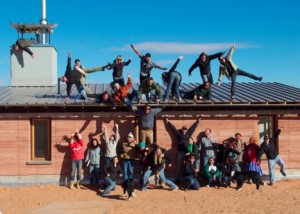Lloyd Alter – Tiny House Meets Digital Fabrication In The FOUNDhouse
 June 2014. First there was the Wikihouse, “an Open Community Construction Set. Its aim is to make it possible for almost anyone, regardless of their formal skills, to freely download and build structures which are affordable and suited to their needs.”
June 2014. First there was the Wikihouse, “an Open Community Construction Set. Its aim is to make it possible for almost anyone, regardless of their formal skills, to freely download and build structures which are affordable and suited to their needs.”
Then there is DesignBuildBLUFF, the wonderful student design/build project from the University of Colorado where “Calloused hands, engaged minds, and open hearts align with resourcefulness and ingenuity to create a home for some of the last people to expect it.”
Read more: http://www.treehugger.com/tiny-houses/
Online Journal: The Age Of Zinc
 What is the age of Zinc?
What is the age of Zinc?
Mjondolos, favelas, ghettoes, slums. Neighborhood to neighborhood, city to city, country to country. Such is the increasingly urban reality all over the world. The people in these neighborhoods are pioneers. Blazing new trails to access greater opportunity for their families, they are building new kinds of cities. Still, every day, recent arrivals in cities come face-to-face with severe exclusion from economies and services. This may be an age of technology and progress for some. For the one-seventh of the world that now lives in urban slums, it is both something more and something less: the age of zinc.
The urban pioneers are not just changing the face of the cities that they inhabit. They are also building new kinds of institutions and social arrangements that are changing us all. Cities and the urbanization of exclusion and poverty are producing new challenges to the way we think, govern, and live. This is a running journal of photography, storytelling, and assorted impressions of these phenomena.
Policy-makers, planners, academics, and other professionals, tend to see cities from the perspective of the “formal” world. These are cities where land occupation and employment is recognized by the law, methods of architecture fit into prescribed theories, and political and social organization is geared towards the primacy of either official government or official business institutions.
This journal is a discussion that attempts to see cities from the perspective of the “informal” world. The nature of both exclusion and innovation when the veneer of the “formal” is stripped away, can introduce us to new ways of thinking and acting. The biggest producers of low-income urban housing in the developing world are not government or private businesses, but the urban poor themselves. One billion people now live in slums, in a world with a world population that is more than 50% urban. The people in these slums face the attendant challenges of lack of access to water, sanitation, and public amenities. Yet they also comprise the economic, social, and political foundations upon which the cities of the Global South are being built. Though the “formal” world fails the urban poor on a continuous basis, the “informal” generates the solutions that point the way to a new kind of urban future.
Read more: http://ageofzinc.com/
Kate Wilkinson – Factsheet: The Housing Situation In South Africa
The provision of housing in South Africa was described as one of the country’s biggest challenges in 1994. But what is the situation now? How many houses have been delivered? And how many more are needed? This factsheet looks at the housing situation in South Africa.
How big is the housing backlog?
A 1994 housing white paper described providing housing to the South Africa’s citizens as one of the greatest challenges facing government. It estimated that the urban housing backlog stood at about 1.5 million houses and that the backlog was growing at a rate of 178,000 units a year.
The 1996 national census revealed that 1.4 million shacks or informal dwellings remained in the country. This represented 16% of the 9-million households in South Africa at the time.
By 2011, the census showed that the number of shacks and informal dwellings had increased to about 1.9-million. However, this then represented about 13% of all households in the country – a decrease of three percentage points since 1996.
Read more: http://africacheck.org/factsheet-the-housing-situation-in-south-africa/
Africa Check a non-partisan organisation which promotes accuracy in public debate and the media. Twitter @AfricaCheck and www.africacheck.org.
Social Housing Regulatory Authority Publications
The Social Housing Regulatory Authority (SHRA) Publications is a South African regulatory organisation formed with the mandate to deliver affordable rental housing, and regulate social housing institutions and the private sector. The SHRA has published an impressive list of resources and studies on their website on social housing.
Read more: http://www.housingfinanceafrica.org/social-housing-regulatory-authority-publications/
Human Right Watch – Shattered Dreams ~ Impact Of Spain’s Housing Crisis On Vulnerable Groups
 hrw.org. May 2014. This 81-page report documents the hardships faced by families who lose their homes after defaulting on mortgage payments amid Spain’s economic recession and massive unemployment. The report is based on in-depth interviews with 44 women and men who have experienced or were facing eviction, civil society organizations, and government officials. Immigrants, women who head households or are victims of economic abuse from a former partner, and children are among the affected groups, Human Rights Watch found.
hrw.org. May 2014. This 81-page report documents the hardships faced by families who lose their homes after defaulting on mortgage payments amid Spain’s economic recession and massive unemployment. The report is based on in-depth interviews with 44 women and men who have experienced or were facing eviction, civil society organizations, and government officials. Immigrants, women who head households or are victims of economic abuse from a former partner, and children are among the affected groups, Human Rights Watch found.
Read more (PDF-format): http://www.hrw.org/reports/shattered-dreams
Louise Scholtz – South Africa: Why Is There Not Enough Affordable Rental Or Social Housing For The Poor In South Africa’s Cities?
 allAfrica.com. May 2014. Why is there not enough affordable rental or social housing for the poor in our cities? As the Constitutional Court’s Grootboom decision highlighted, cities should be read as shorthand for well-located spaces that provide access to economic and social opportunities for the poor.
allAfrica.com. May 2014. Why is there not enough affordable rental or social housing for the poor in our cities? As the Constitutional Court’s Grootboom decision highlighted, cities should be read as shorthand for well-located spaces that provide access to economic and social opportunities for the poor.
This lack of affordable and well-situated rental or social housing accommodation is not unique to South Africa. There are many urban centres in the world where land has run out and state support is insufficient to keep up with demand, let alone plan for the future.
There is also an obsession with ownership that has borne witness to the large scale selling off of rental stock. South Africa has also seen large-scale sales of social housing by municipalities, perhaps more in response to the operational challenges presented by the cost of on-going maintenance and challenges linked to non-payment.
Read more: http://allafrica.com/stories/




